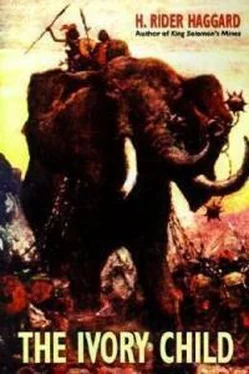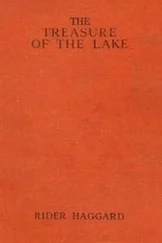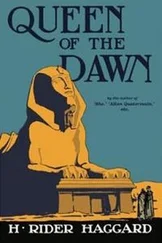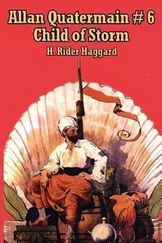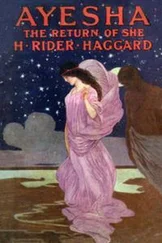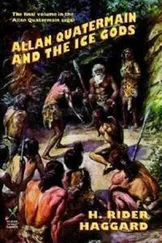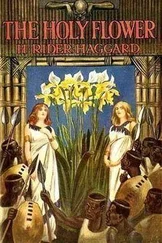Генри Хаггард - The Ivory Child
Здесь есть возможность читать онлайн «Генри Хаггард - The Ivory Child» весь текст электронной книги совершенно бесплатно (целиком полную версию без сокращений). В некоторых случаях можно слушать аудио, скачать через торрент в формате fb2 и присутствует краткое содержание. Год выпуска: 2014, Издательство: epubBooks Classics, Жанр: Фэнтези, Путешествия и география, на английском языке. Описание произведения, (предисловие) а так же отзывы посетителей доступны на портале библиотеки ЛибКат.
- Название:The Ivory Child
- Автор:
- Издательство:epubBooks Classics
- Жанр:
- Год:2014
- ISBN:нет данных
- Рейтинг книги:3 / 5. Голосов: 1
-
Избранное:Добавить в избранное
- Отзывы:
-
Ваша оценка:
- 60
- 1
- 2
- 3
- 4
- 5
The Ivory Child: краткое содержание, описание и аннотация
Предлагаем к чтению аннотацию, описание, краткое содержание или предисловие (зависит от того, что написал сам автор книги «The Ivory Child»). Если вы не нашли необходимую информацию о книге — напишите в комментариях, мы постараемся отыскать её.
The Ivory Child — читать онлайн бесплатно полную книгу (весь текст) целиком
Ниже представлен текст книги, разбитый по страницам. Система сохранения места последней прочитанной страницы, позволяет с удобством читать онлайн бесплатно книгу «The Ivory Child», без необходимости каждый раз заново искать на чём Вы остановились. Поставьте закладку, и сможете в любой момент перейти на страницу, на которой закончили чтение.
Интервал:
Закладка:
Next minute scouts came in who had been watching the camp of the Black Kendah all night.
These were sleeping not more than half a mile away, in an open place on the slope of the hill with pickets thrown out round them, intending to advance upon us, it was said, as soon as the sun rose, since because of their number they feared lest to march at night should throw them into confusion and, in case of their falling into an ambush, bring about a disaster. Such at least was the story of two spies whom our people had captured.
There had been some question as to whether we should not attempt a night attack upon their camp, of which I was rather in favour. After full debate, however, the idea had been abandoned, owing to the fewness of our numbers, the dislike which the White Kendah shared with the Black of attempting to operate in the dark, and the well chosen position of our enemy, whom it would be impossible to rush before we were discovered by their outposts. What I hoped in my heart was that they might try to rush us, notwithstanding the story of the two captured spies, and in the gloom, after the moon had sunk low and before the dawn came, become entangled in our pitfalls and outlying entrenchments, where we should be able to destroy a great number of them. Only on the previous afternoon that cunning old fellow, Hans, had pointed out to me how advantageous such an event would be to our cause and, while agreeing with him, I suggested that probably the Black Kendah knew this as well as we did, as the prisoners had told us.
Yet that very thing happened, and through Hans himself. Thus: Old Harût had come to me just one hour before the dawn to inform me that all our people were awake and at their stations, and to make some last arrangements as to the course of the defence, also about our final concentration behind the last line of walls and in the first court of the temple, if we should be driven from the outer entrenchments. He was telling me that the Oracle of the Child had uttered words at the ceremony that night which he and all the priests considered were of the most favourable import, news to which I listened with some impatience, feeling as I did that this business had passed out of the range of the Child and its Oracle. As he spoke, suddenly through the silence that precedes the dawn, there floated to our ears the unmistakable sound of a rifle. Yes, a rifle shot, half a mile or so away, followed by the roaring murmur of a great camp unexpectedly alarmed at night.
"Who can have fired that?" I asked. "The Black Kendah have no guns."
He replied that he did not know, unless some of my fifty men had left their posts.
While we were investigating the matter, scouts rushed in with the intelligence that the Black Kendah, thinking apparently that they were being attacked, had broken camp and were advancing towards us. We passed a warning all down the lines and stood to arms. Five minutes later, as I stood listening to that approaching roar, filled with every kind of fear and melancholy foreboding such as the hour and the occasion might well have evoked, through the gloom, which was dense, the moon being hidden behind the hill, I thought I caught sight of something running towards me like a crouching man. I lifted my rifle to fire but, reflecting that it might be no more than a hyena and fearing to provoke a fusilade from my half–trained company, did not do so.
Next instant I was glad indeed, for immediately on the other side of the wall behind which I was standing I heard a well–known voice gasp out:
"Don't shoot, Baas, it is I."
"What have you been doing, Hans?" I said as he scrambled over the wall to my side, limping a little as I fancied.
"Baas," he puffed, "I have been paying the Black Kendah a visit. I crept down between their stupid outposts, who are as blind in the dark as a bat in daytime, hoping to find Jana and put a bullet into his leg or trunk. I didn't find him, Baas, although I heard him. But one of their captains stood up in front of a watchfire, giving a good shot. My bullet found him , Baas, for he tumbled back into the fire making the sparks fly this way and that. Then I ran and, as you see, got here quite safely."
"Why did you play that fool's trick?" I asked, "seeing that it ought to have cost you your life?"
"I shall die just when I have to die, not before, Baas," he replied in the intervals of reloading the little rifle. "Also it was the trick of a wise man, not of a fool, seeing that it has made the Black Kendah think that we were attacking them and caused them to hurry on to attack us in the dark over ground that they do not know. Listen to them coming!"
As he spoke a roar of sound told us that the great charge had swept round a turn there was in the pass and was heading towards us up the straight. Ivory horns brayed, captains shouted orders, the very mountains shook beneath the beating of thousands of feet of men and horses, while in one great yell that echoed from the cliffs and forests went up the battle–cry of " Jana! Jana! "—a mixed tumult of noise which contrasted very strangely with the utter silence in our ranks.
"They will be among the pitfalls presently," sniggered Hans, shifting his weight nervously from one leg on to the other. "Hark! they are going into them."
It was true. Screams of fear and pain told me that the front ranks had begun to fall, horse and foot together, into the cunningly devised snares of which with so much labour we had dug many, concealing them with earth spread over thin wickerwork, or rather interlaced boughs. Into them went the forerunners, to be pierced by the sharp, fire–hardened stakes set at the bottom of each pit. Vainly did those who were near enough to understand their danger call to the ranks behind to stop. They could not or would not comprehend, and had no room to extend their front. Forward surged the human torrent, thrusting all in front of it to death by wounds or suffocation in those deadly holes, till one by one they were filled level with the ground by struggling men and horses, over whom the army still rushed on.
How many perished there I do not know, but after the battle was over we found scarcely a pit that was not crowded to the brim with dead. Truly this device of Ragnall's, for if I had conceived the idea, which was unfamiliar to the Kendah, it was he who had carried it out in so masterly a fashion, had served us well.
Still the enemy surged on, since the pits were only large enough to hold a tithe of them, till at length, horsemen and footmen mixed up together in inextricable confusion, their mighty mass became faintly visible quite close to us, a blacker blot upon the gloom.
Then my turn came. When they were not more than fifty yards away from the first wall, I shouted an order to my riflemen to fire, aiming low, and set the example by loosing both barrels of an elephant gun at the thickest of the mob. At that distance even the most inexperienced shots could not miss such a mark, especially as those bullets that went high struck among the oncoming troops behind, or caught the horsemen lifted above their fellows. Indeed, of the first few rounds I do not think that one was wasted, while often single balls killed or injured several men.
The result was instantaneous. The Black Kendah who, be it remembered, were totally unaccustomed to the effects of rifle fire and imagined that we only possessed two or three guns in all, stopped their advance as though paralyzed. For a few seconds there was silence, except for the intermittent crackle of the rifles as my men loaded and fired. Next came the cries of the smitten men and horses that were falling everywhere, and then—the unmistakable sound of a stampede.
"They have gone. That was too warm for them, Baas," chuckled Hans exultingly.
"Yes," I answered, when I had at length succeeded in stopping the firing, "but I expect they will come back with the light. Still, that trick of yours has cost them dear, Hans."
Читать дальшеИнтервал:
Закладка:
Похожие книги на «The Ivory Child»
Представляем Вашему вниманию похожие книги на «The Ivory Child» списком для выбора. Мы отобрали схожую по названию и смыслу литературу в надежде предоставить читателям больше вариантов отыскать новые, интересные, ещё непрочитанные произведения.
Обсуждение, отзывы о книге «The Ivory Child» и просто собственные мнения читателей. Оставьте ваши комментарии, напишите, что Вы думаете о произведении, его смысле или главных героях. Укажите что конкретно понравилось, а что нет, и почему Вы так считаете.
